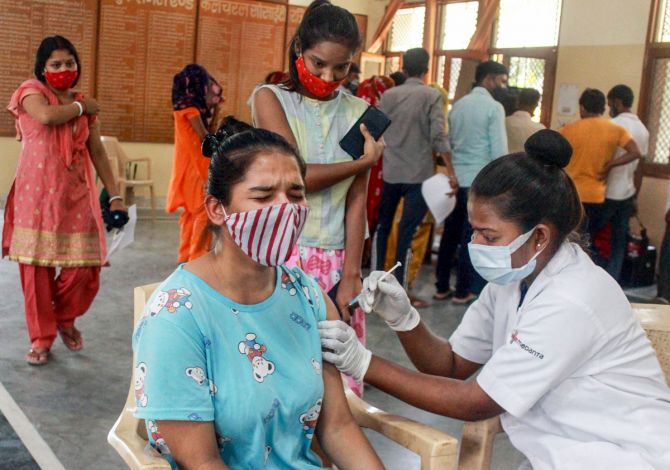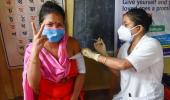A June 11 survey by LocalCircles across 299 districts puts overall vaccine hesitancy levels at 18 per cent, with 11 per cent of the respondents saying they were not convinced if the currently available vaccines would protect them against the new strains; and 5 per cent said they do not plan to take the vaccine at all.
Sohini Das & Ruchika Chitravanshi report

Even as India administered a record 8 million-plus Covid-19 vaccine doses on June 21, up two-and-a-half times the weekly average of 3.2 million daily shots, pockets of vaccine hesitancy continue to exist. While many fence-sitters may eventually opt for the jab, for now, fear, myths and lack of awareness are keeping some from getting vaccinated. According to a few estimates, 17-18 per cent of eligible Indians are reluctant to take the shot.
Sukhlal Yadav (name changed on request) is among them. Yadav, 47, works at one of the many warehouses along the Mumbai-Nashik highway. He is afraid he’ll fall ill if he takes the vaccine. He has seen his neighbours and friends come down with fever after the injection -- a common and temporary side effect of the vaccine.
The public health centres at Padgha and Khadavli towns in Thane district, Maharashtra, cater to this area where several logistics and e-commerce companies have their warehouses and other such setups. A health official at Padgha PHC says people are also shunning the vaccine for religious reasons such as rumours that there’s pig urine and newborn calf serum in it. The long gap between the doses is another reason, with people forgetting to get the second shot.
“This is also the sowing season and people are busy in their fields. So they don’t bother to turn up at the PHC for the jab,” the official says. The centre has now expanded its drive to six sub-centres to take the inoculation movement closer to people’s homes.
Far away in the villages of Uttar Pradesh, the story is similar. People are not keen to take the vaccine out of the fear that they will become infected with the very disease it is meant to counter, or become impotent or even die. Mateen Ahmed, village head of Pahiya Azampur near Lucknow, says, “Some have got the shot, but most do not want to take it. People do not know much about the vaccine as well.”
Kanav Kahol, CEO of DIVOC Laboratories, which is running a helpline to bust myths and encourage people to vaccinate, says of the 250-300 calls they handle daily from rural areas, around 30 per cent say they are afraid of falling seriously ill. “People are also sceptical about whether the vaccine even works and say that what the government is administering is nothing but water,” he says. Some social media forwards warn people to abstain from alcohol for 60 days after vaccination, which is also adding to their reluctance, he says.
Kahol also runs another helpline where he calls up people who have registered on CoWin and urges them to take the jab in time.
A June 11 survey by community social media platform LocalCircles across 299 districts puts overall vaccine hesitancy levels at 18 per cent, with 11 per cent of the respondents saying they were not convinced if the currently available vaccines would protect them against the new strains; and 5 per cent said they do not plan to take the vaccine at all.
Lack of credible information is a major reason, says Kahol. “More than announcing headline numbers with efficacy, a concept few understand, vaccine-makers also need to start disseminating scientific and credible information.”
“At the start of the vaccination drive, the hesitancy was evident among healthcare staff and frontline workers, too,” says Rahul Kalia, medical director, India at International SOS, a health and security services firm.
Kalia, who has held vaccination awareness sessions for several Indian and multinational corporations, says there are three ways in which they can facilitate vaccination, which is still voluntary for most companies: “They can create awareness, ensure access and reimburse the cost of the vaccination.”
Corporate India steps up
Some companies are already doing so. For instance, Amazon India, which has vaccinated 1,00,000 people including its associates, employees and their dependents, is working with its teams to alleviate fears, bust myths and nudge associates to participate in the onsite vaccination events. As part of the initiatives, doctors have been engaged to address vaccine-related doubts; there are informational sessions; celebrity messages to frontline teams; and associates sharing their vaccination experience with their colleagues, an Amazon spokesperson says.
The Confederation of Indian Industry, too, is fighting vaccine hesitancy through two campaigns: “Jaan Hai to Jahan Hai” and “Aap Insaan Hai, Bhagwan Nahi.”
While encouraging its member companies to vaccinate their employees and their families, CII teams are also taking the awareness campaigns to the shop floor, telling workers the benefits of taking the vaccine. “We are finding that the slightest concern mentioned on social media over vaccines triggers a major hesitancy. This is a bigger problem in small towns,” a CII spokesperson says. “People get paranoid because of what they hear from influencers, from those in their circles and even by political comments.”
The queries that International SOS receives from corporate employees are largely around the safety of the vaccine, especially for pregnant and lactating women. There are also concerns around reports of clotting associated with Covishield. And many are hesitant to take Covaxin for the fear of being unable to travel internationally if the vaccine does not get WHO approval.
“Hesitancy was at its lowest at the time of the second wave. Now that the cases are dropping and the worrying images are gone, complacency is setting in,” Kalia says.
Experts say that while staunch anti-vaccinators would be very hard to convince, companies can make vaccination a compulsory condition to join work, like “an invisible arm twist”. The Gujarat government has already asked people engaged in professional activities in the state to get vaccinated by June-end.
Many feel that demand has outpaced the supply of vaccines and as this gets balanced over the next few weeks with higher rates of vaccination, there would still be a lot of fence-sitters. “Some are waiting for a better vaccine,” says Kalia.












 © 2025
© 2025